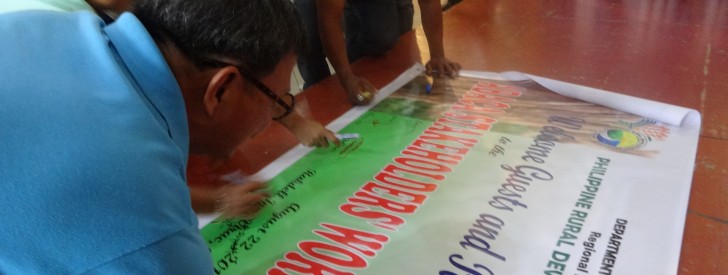 Abaca industry stakeholders in the Province of Catanduanes sign the PRDP Pledge of Commitment.
Abaca industry stakeholders in the Province of Catanduanes sign the PRDP Pledge of Commitment. Catanduanes’ abaca industry stakeholders commit to support PRDP
August 22, 2014
Stakeholders, provincial local government unit (PLGU) representatives and non-government organizations (NGOs) pledged to support the Philippine Rural Development Program (PRDP) to upgrade the abaca industry in Catanduanes during the Abaca Stakeholders Workshop held at Rakdell Inn in Virac on August 22, 2014.
The stakeholders’ workshop is a fundamental part of the value chain analysis (VCA) process under the Investments in Agriculture and Fisheries Modernization Program (AFMP) Planning at the Local and National Levels (I-PLAN) aimed at validating the results of the VCA conducted by Department of Agriculture (DA). Consultants Manny Quisol and Jonah Nobleza underscored this in a separate workshop held in Legazpi City on May 14, 2014. Department of Trade and Industry (DTI) representative Rene C. Valeza, Rollie B. Canada, municipal agriculturist of San Andres, Catanduanes, Department of Science and Technology (DOST) representative Jaime V. Cabrera, and Officer-In-Charge (OIC)-Provincial Agriculturist Roberto Ceballo presented an overview of the existing situation of the province’s abaca industry from the vantage point of each key player. Validation of VCA findings (Info Buzz) was facilitated by Regional Program Coordination Office (RPCO) Region 5 I-Plan Component Staff Mary Ann R. Cuya and PRDP planning specialist Christian Ibaretta.
Floro T. Teaño, an abaca farmer from Bato, Catanduanes and Vicente Samonte, a processor, shared their competitiveness vision for the abaca industry in the province in the next three years including development of tramline sub-station, having highly-mechanized equipment, and exportation. Issues and concerns affecting the abaca industry including lack of technology and market, insufficient support facilities, and poor implementation of programs were also presented by the stakeholders. They also considered potential solutions like road opening, educating abaca farmers, and value-added product training.
Romeo Aquino, Provincial Program Management and Implementation Unit (PPMIU) Head of the Province of Catanduanes, said that PRDP’s focus on resource strength and potential will highly benefit the island province particularly the sustainability of the abaca industry which is one of the province’s local resources. He also aims to increase abaca farmers’ income. “Kasi kahit pinakamalaki kami sa production, kung titingnan mo yung pamumuhay ng mga abaca farmers, hindi sila umaangat. So ang tanong, bakit ganun? Kung malaki ang production ng abaca, dapat sila ang unang umangat,” he added. He explained that the problem lies between production and marketing because of Catanduanes’ remote location which results to higher buying price due to transportation cost. He noted that reducing the transportation cost would have great impact on the abaca farmers.
Philippine Fiber Industry Development Authority (PhilFIDA) reports show that since 2009, Bicol is the top abaca producer in the Philippines with Catanduanes as the biggest abaca-producing province nationwide.
Cuya said that through the workshop, DA was able to know the concerns of the abaca industry stakeholders and gained first-hand knowledge about their situation. She added that PRDP will address other sectors that can help the abaca industry to prosper.
After the workshop, Cuya met with the PPMIU I-PLAN team to brief them about the Orientation and Workshop on Provincial Commodity Investment Plan (PCIP) and Expanded Vulnerability and Suitability Assessment (E-VSA) for the Provinces of Catanduanes, Masbate and Sorsogon to be held on September 2-4, 2014 at Hotel Venezia, Washington Drive, Legazpi City. (Annielyn L. Baleza, I-SUPPORT InfoACE Unit, DA-RAFID 5)
